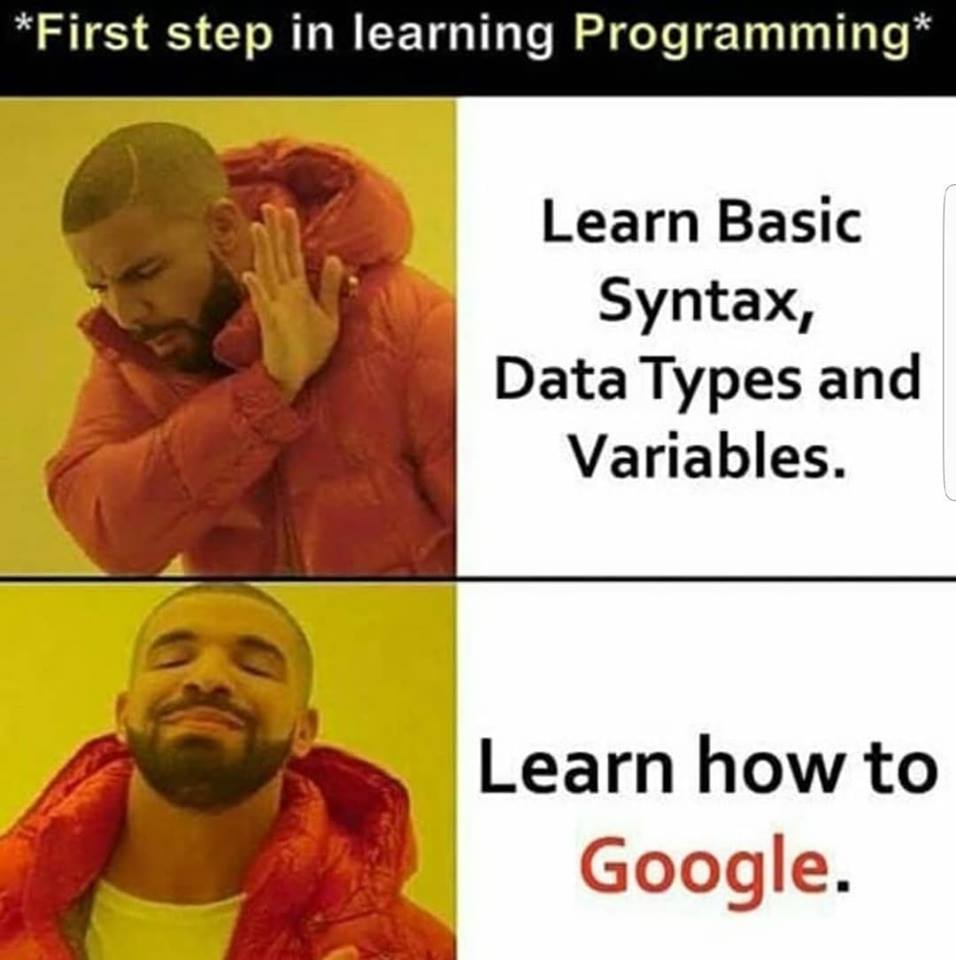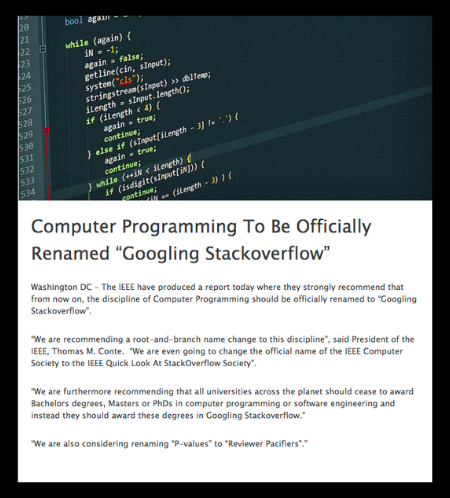As a reader of this blog, you’re probably familiar with the wry observation that the most important tech skill is knowing how to Google for answers. Over the years, this observation has been turned into many, many memes:






I’ll agree that it’s a valuable tech skill. I do it all the time!
However, with nearly 25 years of Google, it’s now assumed that you Google answers in day-to-day office work, just as it’s assumed that you know the basics of using a word processor, spreadsheet, and presentation software (you can still list Excel on your resume if you have deep spreadsheet skills — don’t forget that Excel is the next big esport!).
The “level two” skill
Googling for answers is a “level one” skill. It will serve you well for immediate needs in your daily life.
What you eventually want to do is move to the next level: Writing the answers that people Google for.
Here are the reasons why you want to reach level two:
- It often expands your knowledge of the subject matter you’re covering.
- It establishes you as a credible and knowledgeable source of information on the subject matter.
- It often gets people to approach you with job offers, or offer to pay you for your services, or ask to work for you.
Achieving level two has two key components:
- Putting answers in some online form. Traditionally, this has been writing, but people are increasing looking to video, especially on YouTube (the world’s second largest search engine), Instagram, and TikTok. This is the easy part.
- Getting those answers on the first page of Google results for its search terms or keywords. SEO people love to tell each other this joke: “The best place to hide a body is on the second page of Google results.” This one takes a little more work, and takes into account that no two people get the same Google results for the same search terms.
Level two puts you in demand
On any given week, I get a handful of emails from recruiters, HR people, and the occasional manager with hiring authority asking me if I’d like to leave my current job and go work for them instead. Many of them came in the form of the Dreaded LinkedIn Request:

During last year’s “Great Resignation,” there would be weeks where I’d get one or two dozen such emails and follow-ups. (I’ve turned them down, as my current gig as a Senior Developer Advocate at Okta is pretty sweet.)
Level two gives you an extra portfolio
It’s very helpful to have a portfolio to show to prospective employers, collaborators, co-workers, and customers as proof that you can do what you say you can do.
It’s even better if you have multiple portfolios. You might showcase your work on a site, but also have a Github account where people can look at your work and code. My line of work has also given me a chance to collect media clippings where I’ve appeared or have been quoted, as well as records of my apps in the App Store.
Over the last couple of years, I’ve started a new portfolio: search results for which anything I’ve made is on the first page of Google results. It’s proven handy for my last couple of job searches, as it’s something that other candidates never bring up. It could give you the edge you need!
My “level two” tricks

Write an existing answer, but better!
There are nearly 1.2 billion web pages, so there’s a good chance that someone’s written up an answer to a question. But that answer may not be easy to understand, or wrong, or out of date. Someone else might need that answer in another language. Another reader might need that answer, but applicable to a different circumstance. This is an opportunity to write a better answer!
Here are some examples of this kind of answer from my own page one portfolio…
dates times swift: One of the page one results for this search term is the first article in my Dates and times in Swift 5 series, Creating and deconstructing dates and times. I was unhappy with Apple’s documentation explaining how you represent dates and times in Swift, and equally unhappy with third-party articles on the topic. So I wrote my own tutorial series, and many people point to it as the de facto reference for working with dates and times in Swift.public-key encryption digital signature: There are plenty of explanations of public keys and private keys and how they’re used in encryption and digital signatures, but I’ve always found them rather unsatisfying. I thought that I could explain them better in this article on the Auth0 blog, How to Explain Public-Key Cryptography and Digital Signatures to Anyone.no sound avplayer: This was a simple solution to a problem that many people had when developing iOS apps, where their app failed to play a sound despite instantiating anAVPlayerinstance and issuing the correct method call for playing a sound. My answer, How to fix the common “no sound from AVPlayer/AVAudioPlayer” problem in iOS/Swift programming, was so popular that someone copied it, and their copy also appears on page one of the Google results.fizzbuzz interview: FizzBuzz is an old children’s game that was converted into a simple programming exercise to determine who actually knows how to code. For a while, it was a popular interview question, and my article, Programmer interview challenge 2: The dreaded FizzBuzz, in Python, is on the first page of results for this search term.coding interview linked list: A recent (from last month) article of mine, How to solve coding interview questions: Linked lists, part 1, is on the first page of results for this search term.
Write the answer that nobody else (or nearly nobody else) is providing.
Eventually, you may get the chance to be one of the first people — if not the first person — to post an answer to a specific question, solution to a specific problem, or exploration of a specific topic. This is an excellent way to establish yourself as knowledgable on a given topic and get on the page one results for that topic.
Whenever you encounter a problem that doesn’t have a solution that you can find via Google and the solve that problem, post your solution to that problem!
Here are some examples of this kind of answer from my own page one portfolio…
chromedriver 103 bug/chromedriver 103 not working: Not only is my article, Fix the ChromeDriver 103 bug with ChromeDriver 104, on the first page of Google results, but for me, it’s also the first result on the first page! It covers a workaround that I came up with for a problem where applications and scripts that use Selenium and ChromeDriver to control or automate instances of Chrome or Chromium stopped working with the Chrome 103 upgrade.usb-c ethernet mac: Everything on my Mokin USB-C 10-in-1 dongle worked…except for the ethernet port. I figured out how to get it working, and then shared my solution in this post: What to do when the USB-C ethernet adapter for your Mac doesn’t work out of the box.android emulator crash screenshot: Another problem that I encountered in my daily work and for which I found a solution, which I detail in this article: How to fix the “Android emulator crashes when I take a screenshot” bug.- I have a number of articles on the Auth0 Developer Blog that are page one results for searches for mobile development with Auth0 authentication:
Use titles with good keywords.
As far as I know, I’m the only person who posts a regular list of tech, entrepreneur, and nerd events for the Tampa Bay area, and I’ve been doing it every week for five years. In spite of that, I’m missing from page one of the results for this search:
Why? Because until last week, my titles failed to use the right keywords:
Since 2017, I’ve used the title What’s happening in the Tampa Bay tech/entrepreneur/nerd scene, which fails to use search terms that people are likely to use, such as event or meetup. I’ll try changing it this week and see what happens.
Make sure that your answers have titles that contain words that people will use when searching for your answer.
Put the answer someplace where it’ll be found.
Your answer needs to be someplace where people look for answers or someplace that Google ranks highly. That makes your answer more likely to be found, which makes people link to it, which in turn makes your answer even more likely to be found.
This blog, Global Nerdy, is my personal tech blog, and I’ve been publishing tech content on it since 2006. This is important, as the Google algorithm factor that matters the most for a site is consistent, high-quality content:
This blog also focuses on certain aspects of technology and software development, which means that I’ve established myself with niche expertise on a handful of topics. Google also considers this in its site rankings.
While you can publish content on social media, I strongly recommend that you get your own site, as it gives you more control over your content and its format.
Tell people about your answer.
Once you’ve posted your answer, you need to tell people about it to increase its exposure and “findability.” This is where social media and forums come in handy.
Wait.
Getting on the first page of Google results doesn’t happen instantly; it’s the result of steady, consistent content creation. Keep at it, and you’ll build your own page one portfolio!
Try it out — start working on your answers and build your page one portfolio!


One reply on “The most important tech skill ISN’T Googling for answers, but THIS…”
A friend of mine recommends translating google questions into other languages before searching and regardless of what language you see answers in, you can translate them into english or whatever you prefer – this can present other alternative answers that you otherwise might not find